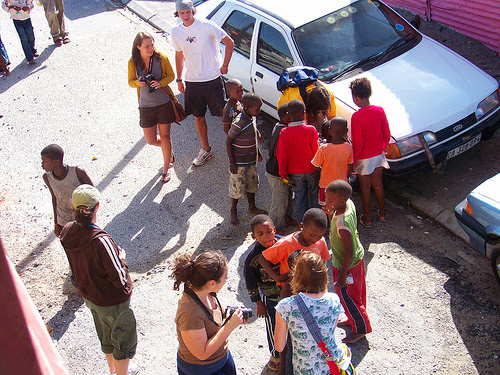When traveling in a foreign country, it can be really frustrating to not speak the language. It is hard enough to get our personal travel goals accomplished when it seems like no one around us speaks English; trying to make any connection with the local people around us can seem like a pointless endeavor. But, one of the overarching themes I found throughout my travels with Semester at Sea last spring is that there are two things which can bridge any language gap: digital cameras and music.
I first encountered the digital camera phenomena in the Khayelitsha township in South Africa. While we visited Khayelitsha, children flocked to my classmates and their digital cameras. They loved having their pictures taken and seeing themselves on the LCD screen. There would often be 5 or 6 South African children crowded around one tiny digital camera.

A few days later I traveled to Mauritius, a small island off the coast of Madagascar. I visited Terre de Paix, which is a school on Mauritius that teaches preschoolers through older teenagers. First we visited the preschool area, where again the children were fascinated by the digital cameras. Not only did they like having their pictures taken, they also loved holding our cameras and taking pictures of us.
Even though these children did not yet know any English, their faces would light up while they played with our cameras. We could tell they enjoyed our time with us even without exchanging any actual words.
Next, we visited the older children. While the preschool at Terre de Paix is for all young children in the area, the older children at the school are there because they did not pass national tests to get accepted into other high schools. Terre de Paix was founded to give these children a chance to express intelligence in other ways, so it focuses heavily on art and other creative activities. The older children know some English, but they are mostly taught in their French creole so it was difficult to communicate with them. They showed us some of the art they were working on (which by the way was way better than anything I could have done) and then brought us into a room full of musical instruments. They sat down to play us a song, and after a few seconds I realized it was a song by The Beatles. Our faces all lit up when we recognized the song, which in turn made them all smile too.
I couldn’t believe that on a random island off the coast of Africa, which I had only recently even heard of, school children were playing us a famous song from our country just so we could recognize it and relate to them and what they were doing. I came away from the trip to Terre de Paix with a new sense of how to relate to non-english speakers.
For awhile it seemed that digital cameras and music only made it easier to communicate with children. It seemed silly to think such simple things could really form a connection between adults. I was proven wrong when I visited a community center in Shanghai, China. Even though the center was open for all adults, it is mostly retired adults who spend a lot of time there.
First, we saw the choir. Like the students in Mauritius, they sang us a few songs they thought we would recognize, like songs performed in the opening ceremonies of the Beijing Olympics. After they sang for us the translator explained they wanted to hear us sing. There were only about 15 of us and we were very caught off guard by their request. All we could think of on the spot was “You Are My Sunshine.” All of the older Chinese adults seemed amused by our attempts, but then demanded we sing a song together. They chose “Edelweiss” from “The Sound of Music.” It was clear by their faces how happy us singing together made all of them.
Later we went into the dancing room, where many men and women were dancing together in pairs. When they saw us come in, some of the pairs separated, and men and women grabbed us and brought us out to the dance floor. An older man grabbed my hands and I was forced to display my awkward dancing for everyone. Even though this man clearly knew no English, I tried to follow his lead and dance with him and he patiently laughed with me at my failed attempts.
From these encounters and many others like them, I found myself wishing I spoke these people’s languages solely so I could thank them for the impact they had on me. I think sometimes while traveling we get so wrapped up in trying to find people we can verbally communicate with who can help us with what we want to accomplish that we forget to make genuine connections with people. I traveled to 12 countries in five months and I couldn’t tell you anything about the numerous people I asked for directions, even though I would often speak to them for over a minute. But these people from South Africa, Mauritius, and China, who I sometimes dealt with only for a few seconds and who I shared no words with, will forever have a special place in my memory.
Next time you are traveling and find yourself getting frustrated over issues of language, remember there are countless other ways to connect with people besides speaking. As cheesy as it may sound, sometimes all it takes is a picture, a song, a dance, or even a smile.
Sarah Hutton is the Student Travels Editor for Wandering Educators.
